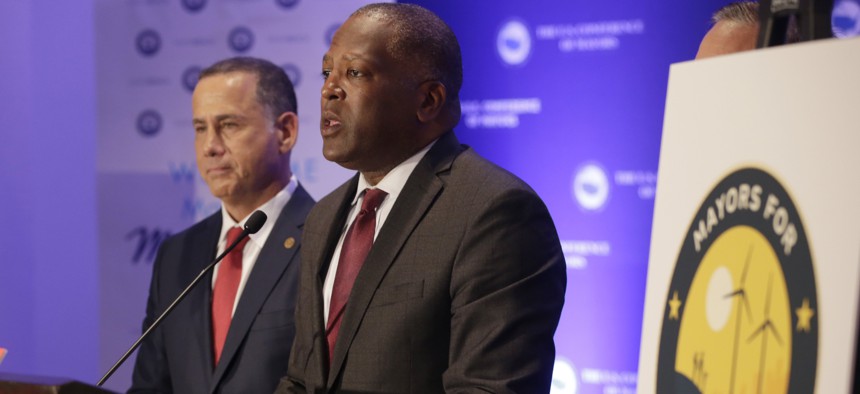The U.S. Conference of Mayors Gets a New President

Steve Benjamin, mayor of Columbia, S.C, right, speaks during a news conference with Miami Beach Mayor Philip Levine, left, at the annual U.S. Conference of Mayors meeting, Monday, June 26, 2017, in Miami Beach, Fla. AP Photo/Lynne Sladky
The group has seen plenty of action in the Trump era.
Columbia, South Carolina Mayor Steve Benjamin on Monday evening took over as the 76th president of the U.S. Conference of Mayors, one of the heavyweight groups advocating for local government interests in Washington.
In the Trump era, the conference has engaged in a number of thorny policy disputes, involving issues like proposed spending cuts, tax policy and immigration enforcement. "It's a very different world working in Washington right now," Benjamin said by phone last Friday. "You just never know what's going to happen next."
The Columbia mayor takes over the leadership post from Mitch Landrieu, whose term as mayor of New Orleans ended Monday.
Benjamin, a Democrat, said he and the Republican mayor of Rochester Hills, Michigan, Bryan Barnett, have worked together on a two-year agenda that centers on three priorities: infrastructure, innovation and inclusion. Barnett is in line to lead the organization when Benjamin completes his time as its president next June.
The mayors and other local government groups have voiced strong support for a sweeping federal infrastructure investment package, something the Trump administration has identified as a priority.
But discussions have faded on Capitol Hill about a public works plan the White House released in February. In the meantime, Congress and the president approved a spending bill with beefy increases for a number of existing infrastructure accounts.
Even with those increases, Benjamin said he hopes "Congress realizes that if we're going to have 21st century infrastructure that's going to compete with other great nations around the world, then the federal government should step up with a real infrastructure package."
The mayor explained that the innovation piece of the platform he and Barnett developed is meant to be broad and could cover topics ranging from how cities can use sensors to assess the effects of air quality on public health, to the deployment of high-speed, 5G internet networks.
Companies looking to build out 5G networks have sometimes been at odds with local governments, with much of the controversy stemming from how quickly firms can gain access to install equipment in public rights of way, and at what cost.
Benjamin said he'd like to see the Conference of Mayors spark some new dialogue on this front. "We've got to get past this period of conflict so that we're able to deploy 5G much more rapidly," he said.
Nevada Gov. Brian Sandoval, a Republican, has made innovation the focus of his one-year tenure as the 2017-2018 chair of the National Governors Association.
The inclusion aspect of Benjamin's agenda is about ensuring "that different points of view, that different life experiences, are all respected regardless of national origin, or faith, or race, or sexual orientation, or geography, or party affiliation," he said.
Some of this, he added, involves bridging divides between places that are economically struggling and those that are thriving. Benjamin said there are plans to launch a small cities forum within the Conference of Mayors to foster discussions about policies these places want to see.
The mayors, lobbying alongside other state and local advocacy groups, have scored some key wins during Trump's time in office.
For instance, Congress rejected White House proposals to eliminate funding for Community Development Block Grants and grant programs that support transportation infrastructure and housing.
But the group has endured high profile losses as well, like its unsuccessful attempt to fully defend a federal deduction for state and local taxes during last year's GOP-led tax overhaul.
Meanwhile, there are ongoing tensions between the Justice Department and some cities over immigration enforcement policies.
In January, the Justice Department threatened legal action against 23 state and local governments over immigration issues on the same day that the mayors kicked off an annual meeting in Washington.
During the same gathering, Trump bashed Democratic mayors during remarks he made to mayors visiting the White House.
Mayors who are members of the conference have been adamant that they will not let bipartisan cooperation among the group erode, regardless of the partisan tenor in the nation's capital.
"We are, I believe, the only level of government where things are actually working and working well," Benjamin said. "Republicans, and Democrats, and independents, all focused on the fact that we've just got to get things done for the people we represent."
Bill Lucia is a Senior Reporter for Government Executive's Route Fifty and is based in Washington, D.C.
NEXT STORY: Boston Officials Propose 'A Better Deal' for Public Housing






